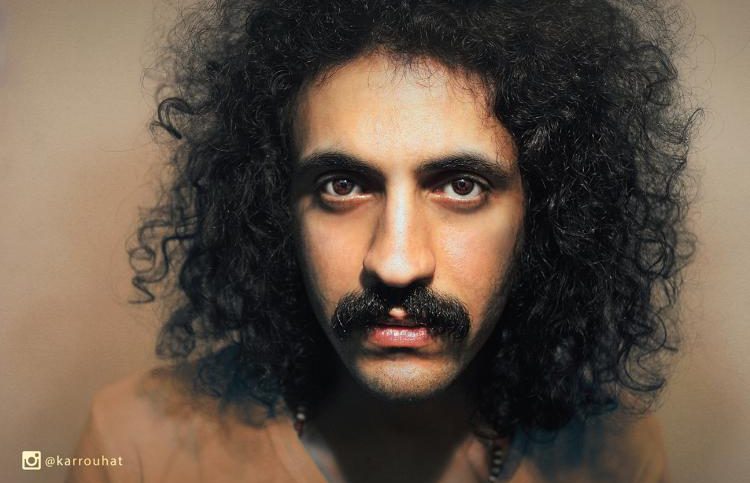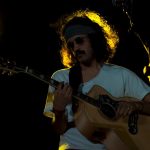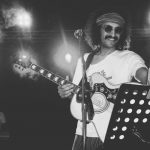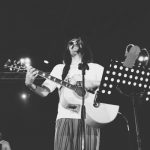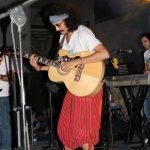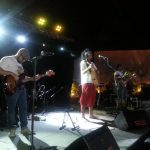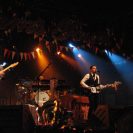For Basil AlHadi, singer, songwriter, and rhythm guitarist of the band Karrouhat, music is a fluid thing that connects us all. Expressing both his love for his roots and his favorite music through his own brand of Arabic Reggae, he is primarily interested in music’s magical ability to connect us all. His belief in positive energy and a joyful spirit have earned him the loving nickname Rasta Baba, by friends and fans alike.
After majoring in Telecom engineering, Basil studied film in New York where he earned a degree in acting. He also got involved in making short films and documentaries, at least one of which was featured in major film festivals in France. Still he always comes back to his musical roots. Currently he is trying to create his signature sound of Arabic Reggae, bringing it from far away Jamaica to the Arab world and enhancing it with Eastern flavors.
As an artist he tries to keep moving so as not to get stagnant and notes the Middle East as being exceptionally inspirational in this regard. As part of the “art salon” group he also tries to help others. Since 2012, he has worked with them to organize events and festivals for peace with the United Nations. They support young artists from the Middle East and try to help them to overcome the early steps to get started as artists. We check in with Rasta Baba to talk all things music.
How did your musical journey begin?
Since long before I was born, my family has been involved in music; it’s in the genes.
My last name AlHadi is itself an old Arabic word that means “the musician who entertains travelers.” My Grandfather was 7adi, he was like the mp3 player of his age. I started out by playing a mostly broken guitar. Also, since I’m left-handed, there are very few places to learn how to play, so I had to start by playing the guitar upside down. I noticed early on that I was pretty good at writing and composing songs so I kept with it.
What/Who inspires you to compose your music?
I’ve always been inspired from the street, society and daily events of life. So, the starting point of a song could be a simple word I hear from a guy working at a gas station, somebody camping in the desert, or even a dream I had while sleeping.
Most of the time while I’m writing the lyrics, the composition is playing in my head naturally. I’m a big fan of the theory of simplicity. I try to compose in a way that anybody can understand because I’m delivering my songs to everybody, not just musicians. Lyrics wise, I’m 100% aware of what is happening in daily life and try to write true to everyday life. Genre wise, I have a very big influence from Reggae music. In the 80s when Bob Marley was pretty big, I had an uncle who was studying in the Philippines. He would bring me back cassettes. I’ll never forget the first time I heard ‘Buffalo Soldier.’ It clicked with me right away and I have been a fan ever since.
Why did you choose this genre of music?
The feeling of the beat and bass is really something remarkably different with this genre, especially when the one-drop feeling invented after the Ska & Rock Steady genres. They all inspired me to create this subgenre called Arabic Reggae. Reggae is all about feeling. The drum part, for example can’t be played stiff and machine-like. He has to groove. If he is not feeling it, the one-drop, it will not work right. The rhythm guitarist as well cannot play on normal ON beats; he should be keeping the offbeat with a chunky style.
What are some of the challenges of performing your music locally?
I think there are not enough venues to host alternative bands that don’t fit the main stream. Also in the beginning it was hard to sing the street language and different topics about life, philosophy, or a dream of eating watermelon on MARS. But at the end of the day, if you believe in what you are doing you will find a way to do it. Another big challenge is that it was hard for event producers and organizers to see that people would enjoy this type of music at events, but now things have started to change. The crowds are bored from the same music and this makes the organizers have to book different types of bands. Honestly I believe we helped to kick-start the music scene here for alternative genres.
Is the final sound of a musical track an individual or group effort?
I believe it is all teamwork! It’s the best feeling to work with people who understand you musically and have the same dream, so the final product is a group effort for sure. Normally though, I start with writing and composing the song as a first draft. We then sit with the band or producer to get the final image in the right frame.
Who/What in your early beginnings influenced your music?
I listen to everything. But some of my favorites are: Asmahan, Aisha ElMarta, Awad AlDoukhi, Ziad AlRahbany, Khalid ElHabr, Bob Dylan, Mohamad Muneer, Pink Floyd, Rodriguez and even gypsy Roman bands. Still, Bob Marley is the biggest influence and all time legend.
In your opinion, what was the hardest challenge you faced in your musical career so far?
The financial support is probably the hardest thing in any musician’s life. You often need a day job doing anything other than music just to feed yourself and family.
You can’t produce without money and there are often many free shows done when you are just starting out. That said, this is all after you have a good product, good lyrics and music to share with people, so the first challenge is having something.
How has the Middle Eastern world reacted to your sound?
I’m not in a place to decide here, but it seems as if people really enjoy it. That’s the feedback I get. I think because I’m talking about daily life in the lyrics, I think everyone can relate to it.
Do you feel that music should always serve a specific purpose?
Sure it should, because it can influence people; so the song should have a message. The songwriter is the person who is responsible for this. I want to send a positive vibe to people so I have to focus on finding the good—even in the worst scenarios.
What are some of your favorite tracks, and why?
I need a full book to fill this list! No doubt though, my mp3 player will always have Bob Marley, Pink Floyd and gypsy music. Beyond that, my list is long.
What is your dream performance space and destination?
Woodstock in 70s era! Other than that, my plan is to tour the Middle East and then a world tour.
Do you have a favorite gig, or place that you’ve played?
My favorite gig—and where we got a very warm reception — was at the International Peace Day last year. We played on a great rooftop venue in Istanbul, Turkey.
What would you like to accomplish in the future?
I have big dreams, and a plan to achieve them. I’m now going to Istanbul to work with musicians and a big record label there. I’ll record my first album officially, between here, Istanbul and London this year. Then I will start touring with my band Karrouhat, the Turkish version. My other plan is to create a musical bridge between Middle East and Istanbul, which I have already started. Of course the current thing I have been working on for many years is the Kuwait music scene. I’ll always keep myself here because of all my friends, and fellow musicians who are working to make this such a great music scene.
When is your next show in Kuwait?
We just had a big show at the end of May. As for what’s next? We have a big show coming up on the 21st of September at CAP for the purpose of Peace. I will also perform soon with a Turkish band that should be a big surprise in Kuwait. Hopefully everybody can make it as it should be a good show. I will post the details to Instagram and Facebook, so be sure to follow me.
To follow Basil and Karrouhat, Instagram @karrouhat or Facebook: basil.hadi. You can also reach Karrouhat Studios on Facebook and YouTube: KarrouhatStudio. Inside/Out brings you the freshest of local music and worldwide industry trends – submit your recordings!



